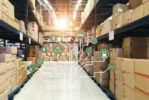
Think Tank
More Adventures in Sustainability: Keurig Green Mountain

Over the past two years, the producer of specialty coffees, teas and brewing systems has been going through a top-to-bottom assessment of its sustainability programs. The undertaking includes a major revision of its supplier guidelines for responsible sourcing.
A publicly traded company with $4.4bn in revenues, Keurig claims modest beginnings. It was founded in 1981 as Green Mountain Coffee, with one roaster in a small coffee shop in the ski town of Waitsfield, Vt. Demand for its product from local customers, hotels and restaurants led to a thriving catalog business, e-commerce site and finally the wholesale arena.
In 2006, the company came together with Keurig, a start-up that was developing brewing technology for offices and homes, to form Keurig Green Mountain. Among its signature offerings is a single-cup brewing system that provides both the machines and sealed “K-Cup” packs of coffee. Today, the company operates eight production facilities in the U.S. and Canada for the beverage side of the business, along with a research and development facility in Vermont.
Monique Oxender arrived at Keurig at just the right time. The former high school teacher had developed the supplier sustainability and human-rights program at Ford Motor Co., overseeing $65bn in spend from 60 countries. Now she was coming to a company that was reevaluating its own sustainability strategy, as it coped with rapid growth and an expansion of its product line.
With Oxender on board, Keurig set out to create a matrix that would highlight the company’s most important social and environmental issues across the supply chain. The research embraced both internal and external partners.
Out of that effort came the new supplier guidelines, which promote “good corporate citizenship” while enforcing compliance with local regulations on workers’ rights and environmental responsibility. “They are meant to reinforce, complement and never undermine the essential role of government in regulating business operations,” Keurig says.
The company keeps tabs on suppliers through a combination of visits from its own buyers and engineers, and subcontractors that monitor activity at the plants. Regular third-party validation is a key part of ensuring compliance.
“It’s a continual conversation,” says Oxender. “Not just once a year.” Even so, as of the beginning of the company’s new fiscal year in October, all suppliers will be required to validate their activities on an annual basis, by way of a supplier portal.
At the same time, Keurig is looking inward. Its corporate social responsibility program has moved individuals over to the coffee-purchasing organization to uphold the company’s standards for product quality, cost and delivery, in addition to good supplier behavior. Oxender considers it vital to extend Fair Trade guidelines from coffee to all of the elements that go into Keurig’s products, including packaging.
The fiscal 2013 sustainability report laid out for the first time some long-range goals. “They really are aggressive,” says Oxender. “They’re hitting on key areas where we have the ability to move the bar.”
Keurig’s sustainability targets for 2020 include the following:
-- Source 100 percent of primary agricultural and manufactured products according to the company’s sourcing guidelines.
-- Achieve zero waste-to-landfill at all owned or operated manufacturing and distribution facilities. (The current level is around 83 percent.)
-- Reduce lifecycle greenhouse gas emissions of brewed beverages by 25 percent compared with 2012 levels.
-- Make 100 percent of K-Cup packs, which currently incorporate some plastic and foil materials, recyclable.
The company has also vowed to “provide access to clean water to one million people worldwide” – a goal that might not be entirely within its power to achieve. However, its own brewing system was designed to minimize the use of water and results in little or no waste.
Keurig claims to have made significant progress toward many of those objectives already. According to Oxender, it has been the world’s largest purchaser of Fair Trade coffee for the last three years. It bought 56.8 million pounds in fiscal 2013 alone, up from 51 million pounds in the prior year. In addition, some 837,000 individuals have received support through company-funded partner projects.
Keurig has kicked in $2.5m to the Blue Harvest Project, aimed at protecting local water supplies in coffee-producing areas of Central America. The effort is a partnership with Catholic Relief Services. It has also earmarked $5.4m for CRS in another project that promotes food security, financial training and income diversification for some 10,000 coffee producers in Central America and East Africa.
Additional investments include $1.9m for Root Capital to fight coffee leaf rust in Latin America, and $1.3m for an initiative with Partners in Health to improve healthcare services in Mexico’s rural coffee-growing areas.
Oxender says the company works hard to balance its social-responsibility efforts between environmental sustainability and human rights. “We have some catching up to do on the environment,” she adds, “but not at the expense of the social-impact picture.” From Oxender’s point of view, the two elements are inseparable. She sees the issue of climate change as ranging well beyond the question of emissions reductions, to include its social impact on farmers.
Meanwhile, Keurig is striving to meet the strict requirements of its own customers, including Wal-Mart Stores Inc. The company became a Walmart supplier in 2009, and has since become actively involved in standards development for both appliances and coffee. For Keurig, sustainability has become a journey that involves everyone from the largest retailer to the smallest farmer.






